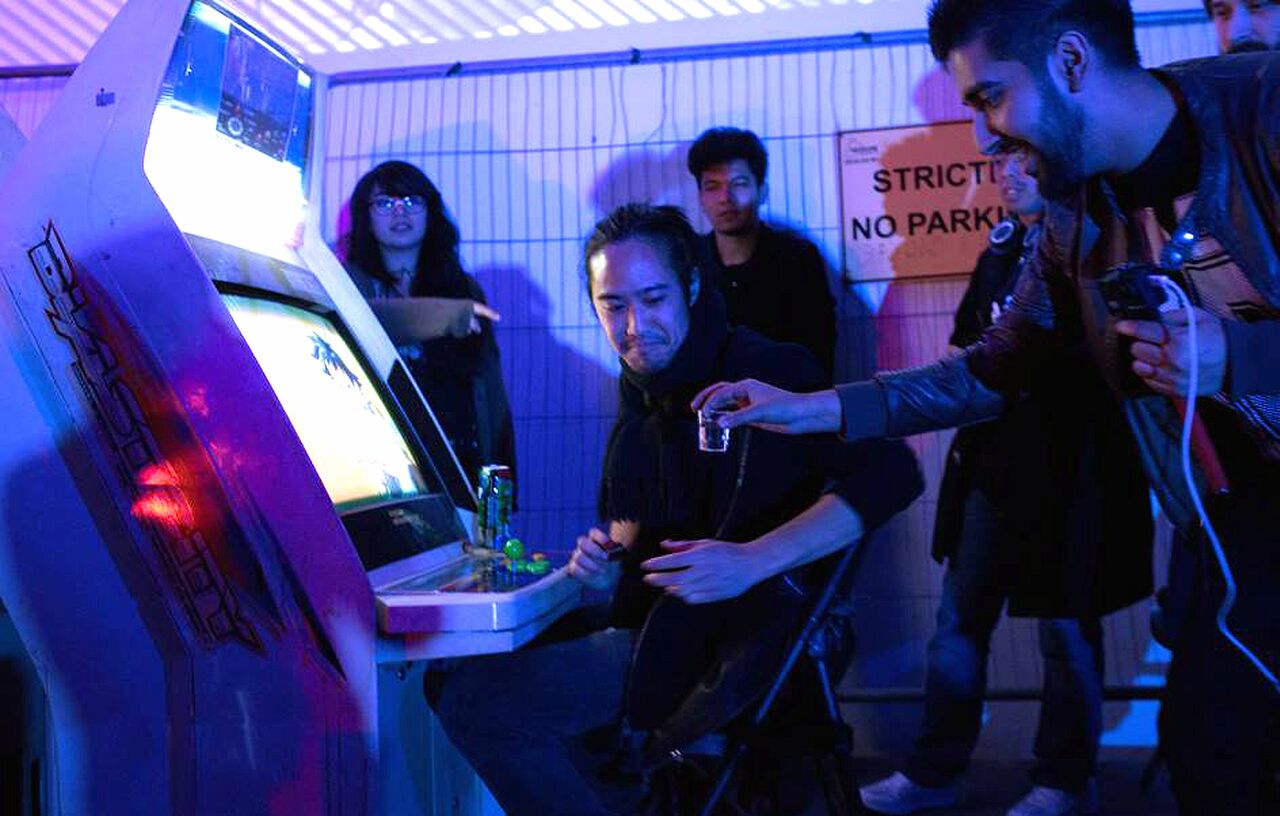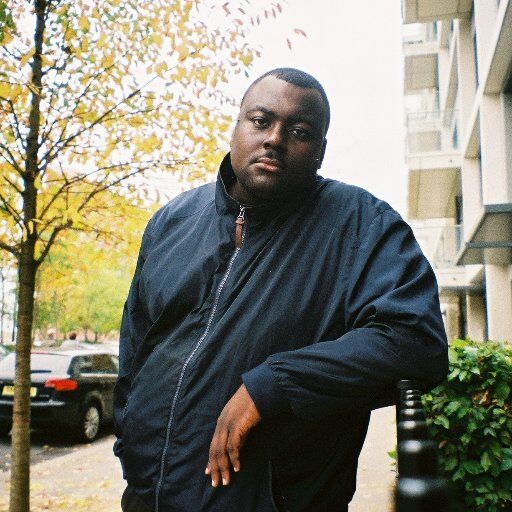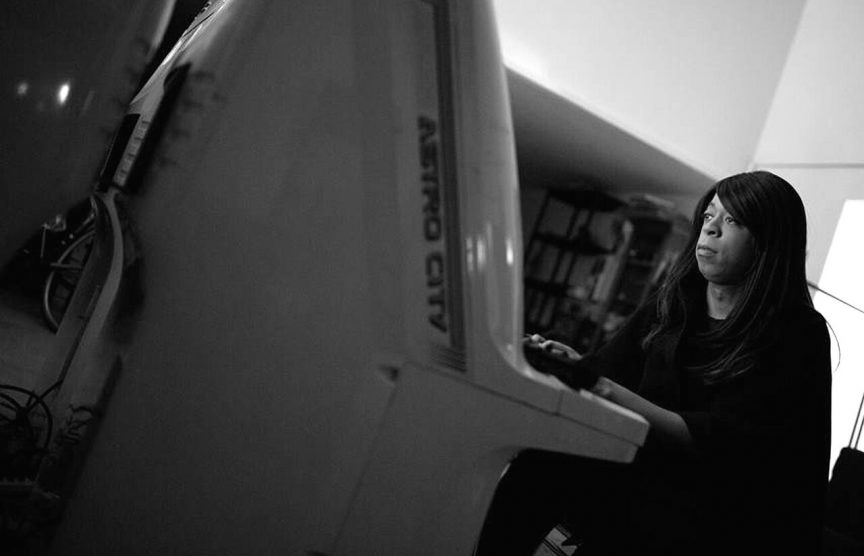Inside the UK Fighting Games Community: Arcades, Grime and Classless Meritocracy
by Marijam Didzgalvyte
25 March 2017

Despite the fact that gaming scenes are often perceived as homogeneous, nothing could be further from the truth – various communities have their own values, aesthetics and social compositions.
Although one could argue that all competitive gaming has meritocracy in common, the fighting games community (FGC) is something quite different. In most other video game formats, it is the time and money a player invests that ultimately leads to their advantage. Fighting games don’t really work that way .
Of course practising (a lot) is important, but what’s crucial is practising in a live context against other (better) players. No amount of playing online will bring the gratification that competing against current champions will. Competing, and issues of latency (the time between pressing a button and it registering in the game), means showing your face at live tournaments and sessions. The vast majority of the FGC are working-class folk who cannot spend days practising. But even if some can, it won’t necessarily give them any serious advantage. Respect in the FGC comes with how good one is at the game.
Given that I am myself come from the left environment, complete with its many hidden hierarchies (eloquence, looks, clothes, education or lack thereof), there was something sobering about the objectivity in FGC meritocracy. One that, unlike conservative understandings of meritocracy, does not involve class privilege. So if someone who was average suddenly becomes amazing , celebrations of that person are in order. Whether that involves trolling with gifs and general banter is another thing, but the player succeeding feels rewarded.
To illustrate these points, I talked to two members of the FGC and asked about their experiences in the scene and how it has affected their lives.
First up we have Darkos Strife, a grime artist, composer and producer who also has an excellent Balrog in Street Fighter V.
MD: At what point did your casual playing of fighting games tip over into something you were willing to invest time into? I know you were travelling to the Fate of Four tournament pretty much every week…
DS: I was always interested in fighting games more than other games; the first one I ever played was Street Fighter Alpha 3. When I was in school, a couple of times I skipped school to go to this place where they tested games, but it was quite far off from the school, so…. (laughs)
I lurked around the arcades too, but would get banged up the first round, didn’t have any money to continue, that was game over. So I started going to tournaments a lot later, around 2009, met a load of like-minded people, a few musicians too, the two worlds kinda collided. This was the time of Street Fighter IV already, the big resurgence of fighting games.
MD: So what was it about the FGC that you always came back to?
DS: I like the way that the FGC organises – the relationships between the members are very equal, so even when people win, these are different people winning at different times so everyone gets to be ‘the leader’, ‘the best’, at one point or another.
More than any other gaming community, I find that in fighting games when you get bodied [short for ‘bodybagged’ -MD], the guy that won will ask if you need any tips, will show you tricks and all that. It’s cool, it’s like a family – we all just want to get good at the game and people will actually help each other to achieve that.
It was sick when I found a proper FGC, it was something I could do when I didn’t do music or it was something that could inform my music or just inspire me to just be better and better.
MD: Were you already making music at this point?
DS: I think I started taking music seriously around 2006 or 2007. It’s been a long process. I would create beats and just give it to other people for them to put vocals on it. I always scribbled lyrics, but took me a while to gain the confidence to start MCing myself. But in a way, developing my skills and gaining confidence in fighting games went hand in hand with me getting better at my music too – if one move/rhyme didn’t work, I’d wanna find out why, so that next time I can rectify that problem.
When I have a live set or something, I would want to listen back to it after and analyse it to see what worked, what didn’t, how do I deliver this better, with more character, how do I get more conviction, how can I be better at another set. Same with fighting games – have to keep on practising and deliver a better performance every time.

MD: So it’s no secret the grime scene has had a long lasting relationship with the FGC, most grime artists have at least a song or two on fighting games. What’s up with that? How was that connection established? I’m thinking D Double – Street Fighter, Lethal Bizzle ft. JME & Face – BOX, P Money – ‘Panasonic’…
DS: It was either done through the arcade culture or just going to youth clubs. We would meet up and play games, later created crews that would make music together. The thing with fighting games is that no matter how much money you’ve got in the arcade, if you lose, you’re gonna have to go to the back of the queue. So there was a real incentive to get good!
MD: Do you see your music as a purely artistic endeavour or do you want it to have political function?
DS: No, I don’t want to sound like politician, we already have enough of that. If people are entertained by what I have to say, that’s cool, but my relationship to music is similar my relationship with games – there are a lot of bad things going in the world right now and people do just want to escape. I do write down my own experiences in my lyrics and sometimes that can be dark, of course, but then losing a bunch of times on Cross Tekken is dark too (laughs).
MD: From stop-and-search incidents to whole raves being shut down by the police, grime has long had a vexed relationship with authority. Do you fear sometimes that with grime becoming so popular that strong political strain will disappear?
DS: Nah I don’t fear that. I think it helps, it gets our story across. When grime started to go mainstream I did fear that it may lose some of its grittiness, the energy, but it hasn’t happened… You have people that still make music how it was made before. People are listening more, appreciating the sound, finding out about different artists and that can only be a good thing. I don’t think it will lose its politics either, only there will be more ears to hear our message.
MD: Red Bull is investing millions into FGC and grime is constantly in the charts these days. There is something odd about the fact that back in the day arcades were a sign of working class culture whereas these days a gaming bar may be sign of gentrification in a neighbourhood. I personally get a bit conflicted about that. Or grime raves, I suppose, used to be massively suppressed by the police are now featured in ads or whatnot. How do you reconcile all this?
DS: The way that I look at it is that back in the day, only certain circles were aware of this community, but with them both going mainstream there is a new influx of talent; it’s a lot more accessible. So after the arcade culture was pretty much over, you used to just have games at someone else’s house. But now there are a lot more welcoming spaces to get good at games. Yeah, the drinks can be expensive and maybe people can’t afford to go every week, but once a month… why not?! Similar with grime; I’m cool with more people hearing what we have to say, some of it will go mainstream, some of it won’t, but it does create more opportunities for people.
MD: Before I let you go, I must ask a question that’s on everyone’s lips: why do you do crouch medium kick from full screen and why does it literally work every fucking time?
DS: (laughs a lot) My signature move! What can I say… With my characters in Street Fighter x Tekken, Christie or Cody – it just works! Though I use it with Balrog in Street Fighter V now, too. If it hits low and I also have V-trigger. Chances are, you’re probably dead. Doesn’t matter how much health you have… You can have health until the ends of the Earth… Game over. Man, that is literally the most difficult question though (laughs).
Follow Darkos Strife on Twitter, and find his instrumentals and grime collaborations on Soundcoud and YouTube.
–
Next I spoke to Danielle Nelson, a really old-school member of the FGC who spoke to us about how much the scene has changed throughout the years and where it could be going next.
MD: How did you get involved with fighting games, and why was it the FGC that you always came back to?
DN: I got into the fighting games scene in 1999. That’s when we were playing games like Soul Calibur and Third Strike. A few popular games were released at that time. I was around a lot at the Luton Galaxy arcade – we had a massive community in Luton, we literally had more people turning up at our ranking events than London… from my perspective anyway!
We had famous players like Shinjin and Ryan Hart showing up for big tournaments, as well as the head of Namco. Around that time I got involved with Tekken Zaibatsu which was the main Tekken website. In 2001 I started travelling to London and competing at a higher level.
MD: What is it about fighting games, do you think, that created those bonds so early in the life of video games?
DN: Fighting games were the first games to really have that competitive edge to them with an added layer of complexity back in the early 90s. It’s not as easy as some early arcades games, there is a lot more space for developing personal techniques. On the other hand it’s a lot more approachable and social than shooter games, for instance, so a lot of people got involved. That level of competition, cussing, as well as co-operative, social elements to it like sharing advice and all – it’s what makes the FGC special.
MD: So I guess you’ve seen the FGC through its many generations and reiterations – how is the scene different now from how it used to be?
DN: Well now it’s definitely more segmented than it was before. Back in the day we used to play all these different games like Super Street Fighter II Turbo, Alpha Three, Third Strike, Capcom vs SNK2, Guilty Gear, Tekken, and we played all of them under one roof. So you play one game, finish playing that game, then move onto another game, then another game, etc.
We used to fly in players from around the world, it was all buzzing back then. We had regular massive events, most notably Super VS Battle, where 1100 people turned up! We took coaches to events, went on big trips abroad – represented, you know! Used to have three- or four-day marathons or even more, find out about all the take-away and supermarket deals, dine out after every arcade night, cutting all the corners (laughs). Doesn’t happen as much any more.
MD: So what happened?
DN: Street Fighter IV happened, basically. Everyone jumped on playing that and the other games were quickly abandoned. It’s true that it brought a load of new players who we ’09ers’ and had reignited fighting games as a whole, though it also made FGC into a commodity, created these celebrity players that started introducing themselves as the representatives of the community. We’ve got a growing scene around Guilty Gear now, but it’s a slow process.
MD: I mean I can’t blame them, Guilty Gear has a pretty crappy aesthetic.
DN: It didn’t used to be like this! Used to be a lot grittier, darker, metal, cages, etc… However, the creators did Disneyfy it a lot – I suppose they want to attract new, younger players. But that’s why I feel that the scene is not what it used to be before, and as I grew older, I just can’t relate it to it as much as I once could.

MD: Has the fact the that the scene is more approachable made it more enjoyable for you? Or is the whole mainstream factor is splitting the community too much?
DN: It’s difficult to answer this. I totally recognise the benefits that money in video games can bring; more people are getting involved, we got big tournaments with large prize pools that attract more competitive players who build their careers in fighting games – that’s all fine.
My worry is that the eSports side of the FGC is becoming synonymous with all other video games. Where as we could capitalise on the brilliant history of the FGC – arcades,working class culture, grime, hip hop – it could be so much more creative than it currently is. Now some FGC tournaments might as well be League of Legends, there’s no difference! What a lost opportunity though, the FGC is not standing out as well as it should, though it already has all that cultural capital behind it! So I don’t mind the competitive side of the FGC, I’m just sad it’s losing its uniqueness and is drowning in the neon lights and cosplay girls aesthetic of other eSports events.
MD: It’s no secret that gaming is a pretty macho business – how did you persevere through all of this?
DN: As I mentioned before, I have definitely taken some space away from the FGC. Partially that is because of the composition of the games being played, but partially yes, it is tricky not to be a loud dude in this scene. Maybe because I already knew players in Luton and London that were respectful of me, the London FGC as it is now perhaps isn’t as welcoming. But as of late, I’ve been also gaining a lot more confidence. Just recently I competed in a tournament in Cannes, did quite well there. Sad, but true though – people will only respect me if I’m good at the game and as a woman I need to try twice as hard. FGC is my home, but it is not immune to these problems.
MD: You see that’s very interesting, because obviously I tend to paint the FGC with a fairly positive brush – I found people that I can relate with here, often because of their class – unlike the left which is stuffed with posh people, and other gaming communities which tend to be more wealthy too. However, as you say – a lack of female representation is impossible to ignore, so thank you so much for talking about that.
Finally, I cannot leave without asking – will you be doing overhead into overhead forever? [Overhead – a move (normal or special) that hits the opponent over their heads which they must block standing -MD]
DN: (laughs) I like doing overheads, but I like doing overheads into overheads into overheads. Even if I should do a combo, I’m still gonna go into overhead, they’re not expecting it. Same with starting my matches with grabbing the opponent’s character straight away – I don’t care much for a defensive game. It’s all mind games, innit!
You can follow Danielle Nelson on Twitter and Instagram.
Banner image and Danielle photographed by James A. Holland aka Sendo.